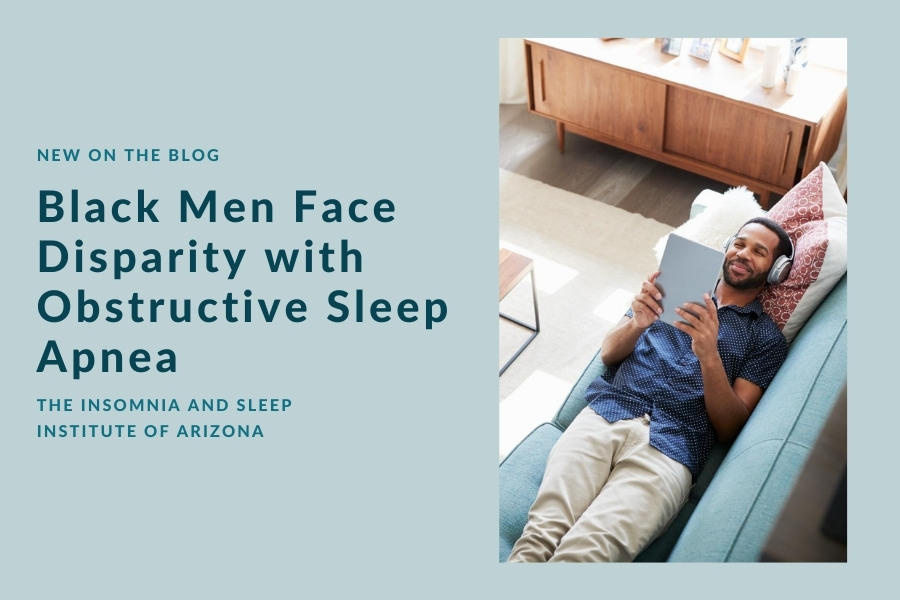Obstructive sleep apnea (OSA) is highly prevalent around the world, with about 1 in 15 American adults struggling with this sleep disorder that doubles your risk of sudden death. It is one of the most common reasons patients from around the country seek out The Insomnia and Sleep Institute of Arizona, home to the “Top Doc” in the region for the last six consecutive years. Known as the “Face of Sleep Medicine” in the state, we set the standard for sleep medicine with multiple sleep specialists and a host of additional sleep experts such as nurse practitioners trained in sleep medicine and a physician assistant with a Masters in Sleep.
The Black community faces a number of disparities, including health disparities, but a recent study has also found that Black men, in particular, have more severe OSA than other demographics. The silver lining is that this is only true upon first diagnosis. The full research is published in the Annals of the American Thoracic Society and details how Black people (especially men) have more OSA symptoms upon initial presentation along with more severe OSA symptoms during polysomnography.
Black Health and OSA
The researchers evaluated a number of disparities related to OSA, considering 890 adult patients who were recently diagnosed with this sleep disorder. The patients were all at the University Hospitals Cleveland Medical Center sleep labs and were seen between 2007 – 2010. Just over half of the participants were Black and the others identified as white. In total, 31 percent of Black patients were men while 56 percent of white patients were male. The total cohort included 141 Black men with OSA and 247 white men with OSA.
Every participant in the study completed a questionnaire as well as a laboratory polysomnography test. The ethnicity and gender of each patient was compared along with the severity of symptoms. The mean age of the patients was 51 and the mean BMI was 37.5 (which is well above what is considered a healthy body mass index or weight). It is well-known that obesity and extra weight plays a role in OSA and other sleep disorders.
Black Disparities in Sleep Disorders
Even though there were fewer Black men in the cohort than white participants, the former demographic presents with the most severe OSA. They averaged many more “events per hour” in the sleep study compared to white men, Black women, and white women. Plus, the biggest “burden” of OSA symptoms was also present in Black men. This was determined with the mean Epworth Sleepiness Scale score, with Black men having a 60 percent higher chance of “witnessing” apneas compared to white men. They also reported more drowsy driving incidents.
The researchers say that more work is necessary to pinpoint why there is a delayed diagnosis of OSA in Black men, but for many in the Black community the colloquial knowledge is solid. A number of factors go into the “why” behind why many Black patients do not get the diagnosis, testing, treatment, and services they need when it comes to healthcare. Black people face incredibly disproportionate disparities for a large number of diseases and disorders, including sleep disorders. However, The Insomnia and Sleep Institute is committed to helping all patients who want to see a sleep specialist immediately so that proper testing and treatment (if applicable) can follow. We treat adults and patients as young as two years old with no referral needed.
Managing OSA
Some lifestyle changes can help with OSA, such as weight reduction if that is a factor. However, many people with OSA need additional treatments, such as CPAP therapy. Those who experience a failure with CPAP therapy may be eligible for implants for OSA. We offer a variety of treatment options for OSA and other sleep disorders, and are committed to getting a correct diagnosis as quickly as possible. Given how dangerous OSA is and the high rate of those going undiagnosed, it is paramount that if you suspect sleep apnea in yourself, a bedmate, or a child, that you seek out the leading sleep specialists.
Schedule your consultation with a sleep specialist right now. You can connect with The Insomnia and Sleep Institute by calling the office or, for the fastest response, simply fill out the online form.





